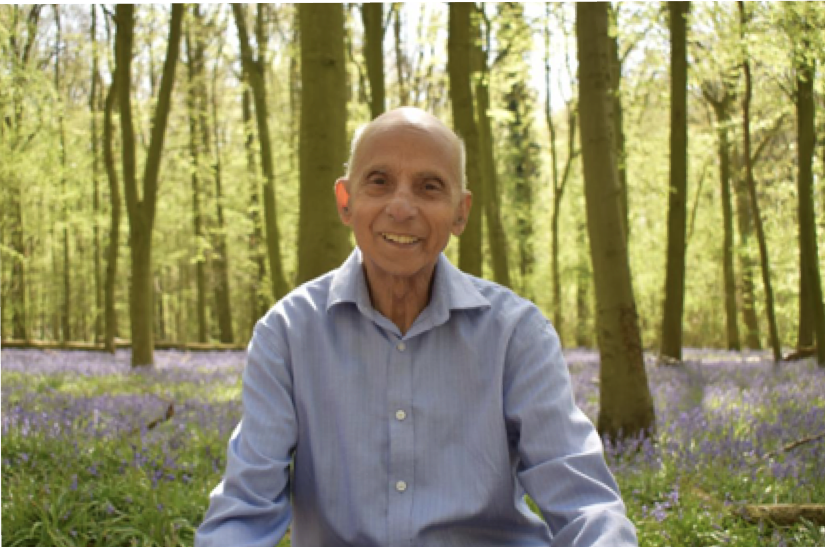
A Daughter’s Reflection on Life And Legacy
Dr Satinder Nath Ganju
(1st May 1927 – 7th November 2020)
A Daughter’s Reflection on His Life And Legacy
As we approach the 6 month anniversary of my father, Dr S.N. Ganju’s passing, it is with gratitude that I reflect on his life and his legacy.
My father was born in Narpristan, Srinagar, Kashmir in 1927 as the only son (along with two daughters) of Lachkuji and Dina Nath Ganju. As with many of my father’s generation, his father tragically perished in 1947 during the turmoil of the partition of India and whilst my grandfather’s body was never recovered and my grandmother waited in vain for his return, my father and the family survived on the generosity of their extended family and friends. They generously supported my father’s education to study Pharmacy in Benares Hindu University and then a PhD in Pharmacology in Chelsea College, now part of King’s College, London. This support had a profound and abiding impact on my father and he recognised that whilst he could not repay his benefactors, he could in turn pass on that generosity to the next generation.
Over the years this was manifested as supporting numerous family members through their education or in sponsoring young Kashmiri musicians to advance their careers. To his dying day he lived and breathed that philanthropic philosophy, eternal optimism, resilience and his deep love of all things Kashmiriyat which is reflected in the messages that are posted on the blog.
After his PhD, he returned to India to set up Chelsea Pharmaceuticals in Pune, Maharastra, with the support of his brother-in-law Mr Prithvi Nath Kaul. In 1959 he married my mother, Dr Durga Kaul and they had two daughters, my sister, Anita, and me.
In 1971 our family moved to the UK and took up residence in Luton. Over the next five decades my father dedicated himself to the Kashmiri Pandit community in the UK, as one of the founder members and President of the Kashmiri Pandit Association of Europe. He also established Kashmir Bhavan Centre (KBC) in Luton. Determined that Kashmir’s cultural and linguistic heritage should be passed on to the diaspora he motivated the community to hold biennial ‘get togethers’ (at Shivratri and Diwali) as well as annual music festivals for well over 20 years. Many Kashmiri artists, such as Shri Rajender Kachroo, Shri Dhananjay Kaul, Dr Deepawali Wattal, Ustad Waheed Jeelani attributed their success to the opportunities they received, early in their careers, to perform in the UK.
Of note was the launch, at the High Commission of India in 2003, of a website (www.siraurelstein.org.uk) which focuses on Sir Auriel Stein as a Sanskrit scholar. The website developed by the Principal Research Investigator, Professor S.N Pandita, was sponsored by KBC and supported by the Heritage lottery Fund, the Bodleian Library Oxford, Nityanand Shastri Library Collection Delhi to promote Kashmiri Culture and common heritage of the people of England and India.
Also of note, KBC sponsored ‘Kashmir voices’ celebrating the stories and history of the Kashmiri community in Luton, supported by the Heritage Lottery Fund and displayed in the Luton Museum in 2012.
All these activities and projects were of course the hard work of many individuals but the energy and dedication was undoubtedly spurred by my father. His love of Kashmir was infectious and although I was neither born nor lived in Kashmir, it was a bittersweet memory that his passing led me back to Kashmir.
My noble and ever optimistic father passed away on 7th November 2020 at the ripe age of 93, in Delhi, India. I flew from the UK immediately, despite the travel restrictions due to the pandemic, to join my sister, Dr Anita Kaul, to conduct our father’s funeral rites in full Kashmiri Pandit tradition. However rather than going to Haridwar, Anita and I decided my father would have wished to be laid to rest in Kashmir.

We got up early on 12th November and made our way to Atim Niwas in Noida where we swept up our father’s ashes with our bare hands and put them into an urn. Having all tested negative for Covid, Anita, Dr Sameer Kaul – my brother-in law – and I headed with our father’s asthi kalash to Delhi airport and boarded a plane to Srinagar. All arrangements for the visarjan were made by Sameerji and we drove to Naranbagh near Shadipora where we were met by a Panditji who solemnly conducted the puja on the banks of the Vitasta, in front of a neatly maintained Shiv temple. With the help of a shikara wallah, the three of us transported our father’s asthi kalash to the sangam of the rivers Vitasta and Sind at a place often referred to as Prayag. There, next to an island, allegedly some 5000 years old, bearing a beautiful solitary Chinar tree, we immersed our father’s ashes into the waters. We then climbed onto the island and prayed for him at the Shiv lingam on the Island under the Chinar tree. The day was the most serene in my living memory and we were at peace knowing my father was back in his beloved Kashmir. He is survived by his daughters and 5 grandchildren; his wife having predeceased him.
May his soul reach moksha.


